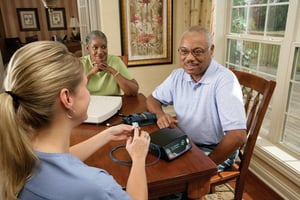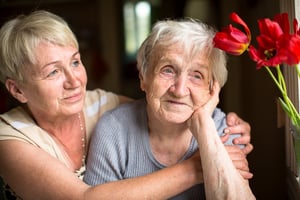Medicare and Medicaid patients dealing with illness or recovering from surgery or injury may be...
The Role of Homecare Professionals in Fight against Ohio’s Opioid Epidemic
In 2016, the Cuyahoga County Coroner’s Office estimated that the opioid epidemic has claimed the lives of over 600 people just in Cuyahoga County. That’s more than double the 2015 death toll due to opioid overdose.
Homecare professionals – nurses, home aides, social workers, counselors and other home health professionals – are in a very unique position to help curb this staggering statistic. Early intervention may be possible for many patients who suffer from opioid addition with the help of homecare professionals.
The mental health team at Visiting Nurse Association of Ohio suggests there are four ways homecare professionals can help combat the opioid crisis.
1. Monitoring and Assessment. Recognizing warning signs and asking the right questions are the first steps. Here are some examples:
- Does the home environment suggest drug or alcohol misuse?
- Is more than one physician prescribing narcotics for the patient?
- Ask questions that address any risk factors for substance abuse.
- Ask specifically about substance use and any negative impact use may have had.
2. Education. Talking to your patients in the comfort of their homes may make them more likely to retain information about addiction, consequences and their options for recovery.
- Develop discharge goals with the patients.
- Discuss pain management.
- Discuss stress management.
- Suggest changes lifestyle and health habits.
- Discuss important issues such as:
- risk of misuse of prescription pain medication;
- tolerance, dependence, and addiction;
- possible consequences and treatment options;
- and the importance of preventing diversion of pain medication by limiting access of others.
3. Safe Disposal of Medication. Dispose of any expired prescription drugs in the home to prevent accidental or intentional misuse. Some illegal drugs like Fenanyl and Carfentanil are so dangerous that they should not even be touched or exposed to skin. If you suspect or know that a patient is using these drugs, contact the police immediately.
4. Referral. Patients can benefit from the caregiver’s extensive network of resources and he/she can make recommendations based on the individual patient’s need.
Of course, there are still many challenges that homecare professionals face. Many say that they fear for their safety when dealing with patients who suffer from addiction. There is also a sense that they don’t have the training or experience to deal with a violent patient or one who suffers from opioid addiction.
To address some of these important concerns, VNA of Ohio will present a special Continuing Education presentation. Led by psychiatric nurse Thomas Huggins, this CE will cover these issues in depth. Subscribe to our email alerts for more information about the event which will take place in May 2017. The CE is intended for nurses, counselors and social workers.
VNA of Ohio was proud to partner with the national organization, Police Assisted Addiction and Recovery Initiative (P.A.R.R.I.)’s “Safe Passages” program that police departments in Bedford, Berea, Olmsted Falls/Township, North Olmsted and many others in Ohio have implemented. Learn more about the program and how you can support the organization here.
Call VNA of Ohio Today
VNA of Ohio is the only home healthcare organization in Northeast Ohio that offers in home mental health care services. Learn more about our services or call us today at 1-877-698-6264.




